Bat (heraldry)
The bat (also called the reremouse, reermouse, or rearmouse) is a heraldic symbol sometimes used as a charge, but most prominently used as a crest on or around the crown in municipal arms of the former Crown of Aragon—specifically in Valencia, Catalonia and the Balearic Islands.
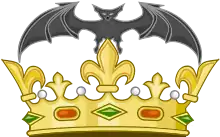
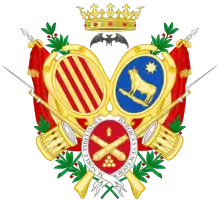
Origins
The heraldic use of the bat has its origins in the "royal dragon" crest (cimera reial) of the coat of arms of the Kings of Aragon. The royal helmet has a víbria, a traditional Catalonian dragon, emerging from a crown as its crest. Although traditionally the dragon helmet is ascribed to king James I of Aragon (1208 – 1276),[1] reliable documents state that the winged dragon didn't appear over the helmet until Peter IV of Aragon's reign (1319 – 1387). This crest was then transformed into a bat by municipalities.[2]
There is also a legend of a bat causing King James I of Aragon to win a crucial battle against the Saracens that allowed him to win Valencia for his kingdom. However, original documents state that the animal was a swallow and not a bat.[3]
The bat in official heraldry
The coats of arms of certain cities in eastern Spain, like Valencia,[3] Palma, Mallorca[4] and Fraga[5] have the bat over the shield. Some smaller towns, like Catarroja and Novallas, also use this symbol.
Formerly the Barcelona city coat of arms had a bat crowning it as well, but the bat was removed at the beginning of the 20th century for unknown reasons. The city of Teruel[5] used to have the bat surmounting the coat of arms' crown. There the bat represents a commemoration of the role of this city in the conquest of Valencia.[6] The bat now rests just below the crown in Teruel's seal.
While the use of the bat as a heraldic symbol is prevalent in the territories of the former Crown of Aragon it is rarely used elsewhere. However, it can be found in a few places, including in the coats of arms of the city of Albacete in Spain, the town of Montchauvet, Yvelines in France, Fiefbergen in Schleswig-Holstein, Germany and the former Borough of Brecknock and historic county of Brecknockshire in Wales, UK. Outside of Europe, the coat of arms of Santa Fe de Antioquia, Colombia includes multiple bats; it was granted to the town in 1545 by Charles I of Castile and Aragon and his mother, Joanna of Castile.[7]
Other uses
Based on the heraldic symbol of their city, certain Spanish association football club badges, like Albacete Balompié, CD Alcoyano, Levante UD and Valencia CF, have a bat on them. The ancient badge of the FC Barcelona, used during the 1899-1910 period, had a small bat crowning it as well.[8]
The Burgee of the Royal Valencia Yacht Club (Reial Club Nàutic de València) displays a bat on a golden field in its center.
Lo Rat Penat, a political organization based in Valencia in 1878, was named after the heraldic bat. Established by Constantí Llombart, Teodor Llorente and Fèlix Pizcueta, its aim was originally to foster a movement similar to the Catalan Renaixença in the region of Valencia.
The No. 9 Squadron RAF adopted the bat badge in 1917 along with the Latin motto Per Noctem Volamus "We fly through the night". The badge was approved by King Edward VIII in November 1936.[9]
Gallery
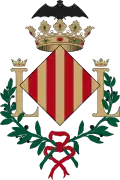 Valencia city's arms
Valencia city's arms Present-day arms of Palma de Mallorca
Present-day arms of Palma de Mallorca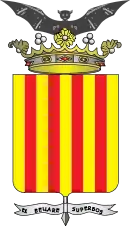
 Teruel city coat of arms
Teruel city coat of arms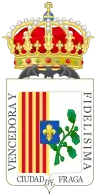 Coat of arms of Fraga
Coat of arms of Fraga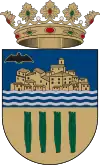 Coat of arms of Catarroja
Coat of arms of Catarroja Burgee of the Royal Valencia Yacht Club
Burgee of the Royal Valencia Yacht Club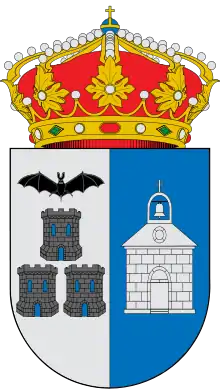 Coat of arms of Munera
Coat of arms of Munera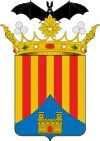 Coat of arms of Novallas
Coat of arms of Novallas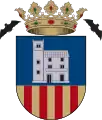 Coat of arms of Emperador
Coat of arms of Emperador Coat of arms of the city of Albacete
Coat of arms of the city of Albacete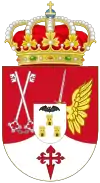 Coat of arms of the Province of Albacete
Coat of arms of the Province of Albacete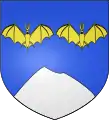 Coat of arms of Montchauvet, France
Coat of arms of Montchauvet, France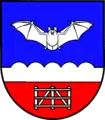 Coat of arms of Fiefbergen, Germany
Coat of arms of Fiefbergen, Germany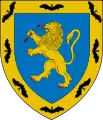 Coat of arms of Pácora, Colombia
Coat of arms of Pácora, Colombia Coat of arms of Santa Fe de Antioquia, Colombia
Coat of arms of Santa Fe de Antioquia, Colombia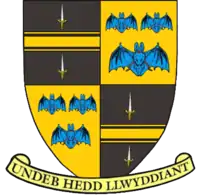 Coat of arms of the historic county of Brecknockshire, Wales
Coat of arms of the historic county of Brecknockshire, Wales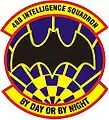 488 Intelligence Squadron patch
488 Intelligence Squadron patch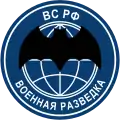 Emblem of the Voennaya Razvedka
Emblem of the Voennaya Razvedka Former arms of Palma de Mallorca with the winged dragon crown known as Cimera de la Festa de l'Estendard without the helmet. 17th century
Former arms of Palma de Mallorca with the winged dragon crown known as Cimera de la Festa de l'Estendard without the helmet. 17th century.svg.png.webp) Barcelona coat of arms (17th-18th Centuries) with the Royal Winged Dragon (Vibra) crown and the helmet
Barcelona coat of arms (17th-18th Centuries) with the Royal Winged Dragon (Vibra) crown and the helmet.svg.png.webp) c.1790-1870 coat of arms already displaying a bat instead of a dragon on top of the helmet
c.1790-1870 coat of arms already displaying a bat instead of a dragon on top of the helmet Late 19th century Barcelona coat of arms at Mercat de Sant Antoni, Barcelona
Late 19th century Barcelona coat of arms at Mercat de Sant Antoni, Barcelona
See also
| Wikimedia Commons has media related to Bats in heraldry. |
References
- Diario de Palma - Vicisitudes históricas en torno a la cimera de Jaime I
- Fatás Cabeza, Guillermo (2000). "El Escudo de Aragón. Epílogo: El dragón d'Aragón". In Gobierno de Aragón (ed.). Aragón, reino y corona: Centro Cultural de la Villa de Madrid, del 4 de abril al 21 de mayo de 2000 [Aragon, kingdom and crown: Cultural Centre Villa de Madrid, 4 April-21 May 2000] (pdf) (in Spanish). Zaragoza. p. 174. ISBN 84-8324-084-X. (pdf: link).
- Luis Tramoyeres Blasco, Lo Rat Penat en el escudo de armas de Valencia
- Antoni I. Alomar i Canyelles, L'Estendard, la festa nacional més antiga d'Europa (s. XIII-XXI) Palma 1998
- Blanco Lalinde, Leonardo (2005). "La Tabla De Magistratura de la Audiencia Territorial de Zaragoza (s. XIX)" [The Magistrate’s Table of the Territorial Hearing of Zaragoza (19th c.)] (PDF). Emblemata-Revista aragonesa de emblematica. 11: 231. ISSN 1137-1056.
- Old Teruel city coat of arms
Blanco Lalinde, Leonardo (2005). "La Tabla De Magistratura de la Audiencia Territorial de Zaragoza (s. XIX)" [The Magistrate’s Table of the Territorial Hearing of Zaragoza (19th c.)] (PDF). Emblemata-Revista aragonesa de emblematica. 11: 242. ISSN 1137-1056. - REUNA - Municipio de Santa Fé de Antioquia
- "L'origen dels colors i l'escut del Barça". Archived from the original on 2011-08-31. Retrieved 2009-02-12.
- "RAF Bomber command". Archived from the original on 2008-12-06. Retrieved 2009-02-14.
External links
- Blason de Valence (in French)
- Cimera del Casal de Barcelona (in Catalan)
- Cimera de la Festa de l'Estendard (in Catalan)
- Barcelona coat of arms (in Catalan)
- FC Barcelona, old badges (in Spanish)
- Lo Rat Penat (in Catalan)
- El ratpenat - Homenatge indirecte al València CF (in Catalan)